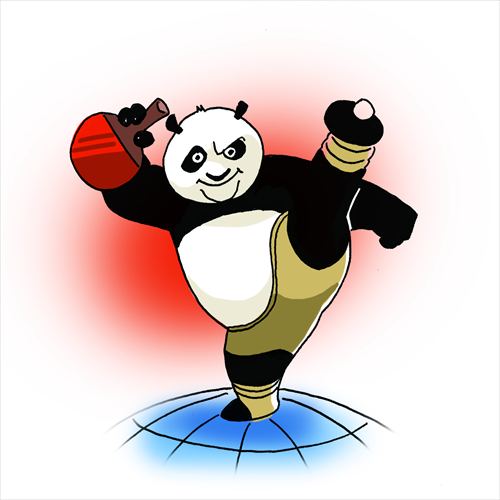Table tennis dominance gives pause for thought among Chinese fans

Illustration: Liu Rui/GT
When people talk about the kings of basketball, they definitely refer to US teams. But in table tennis (ping-pong) China is undoubtedly the star.
Last week, China underlined this status when its players grabbed the gold medals for the men's singles, women's singles, men's doubles and women's doubles at the world championships held in Suzhou, Jiangsu Province.
The achievements of the Chinese stars were no surprise to Chinese fans. As China's national sport, table tennis has become a source of pride alongside the Great Wall and pandas.
However, this pride was undermined by comments from the country's outspoken TV host Bai Yansong who argued the national team's regular glory is bad for this sport. He feared that China's dominance in table tennis makes the sport a one-country show, which is no good for either the sport or China.
It's certainly true that very few other countries take table tennis seriously as a competitive sport. And while the average value of an NBA team is over $600 million, even top table tennis players outside China don't come with a lot of brand value.
But Chinese netizens are not that pessimistic.
They believe the Chinese team's victory shows the country's strength in this sport, and the international influence of table tennis is determined by this sport's own charm, which has nothing to do with the country's international status.
It is interesting to note that when there are people denouncing something that others feel proud of, patriotic Chinese netizens, even the skeptical ones, will choose to fight back to preserve this pride. In the case of table tennis, such pride is closely linked to historical sentiment.
At the turn of the 20th century, China was named the "sick man of East Asia" and was barely seen in international sports. Such national humiliation continued until Rong Guotuan won the men's singles gold at the table tennis world championships in 1959, which largely boosted national pride and patriotism.
Back in the 1970s, the "ping-pong diplomacy," exchange visits of ping-pong players between China and the US, helped bring then US president Richard Nixon to China, which paved the way for the normalization of Sino-US ties. Sports in China, especially the table tennis, had been burdened with many political connotations. Originally it was a way that China strived to obtain a presence on the world stage.
But as China rises to the center of the world, there has been nationwide reflection on China's victories in sports, and many people began to adopt a rational attitude toward the meaning of sports - is it a tool to boost a nation's prominence or simply a way to fulfill self-satisfaction?
Bai once predicted that the table tennis would be the first sport to move the Chinese away from medal-worshipping, and he might be right. It is also necessary to think how to keep this sport in the international arena and make it a competing one. Due to China's long dominance in table tennis, the World Table Tennis Association even wanted to change rules to set obstacles for the Chinese, but such moves haven't seen fruit.
Chinese people are willing to see the national team be challenged by players from all over the world, because that's the essence of the game. The world should also keep a fair attitude toward this sport. The decline of table tennis would be a loss not only to China and the world, but also the whole sporting culture.
The author is a reporter with the Global Times. wangwenwen@globaltimes.com.cn